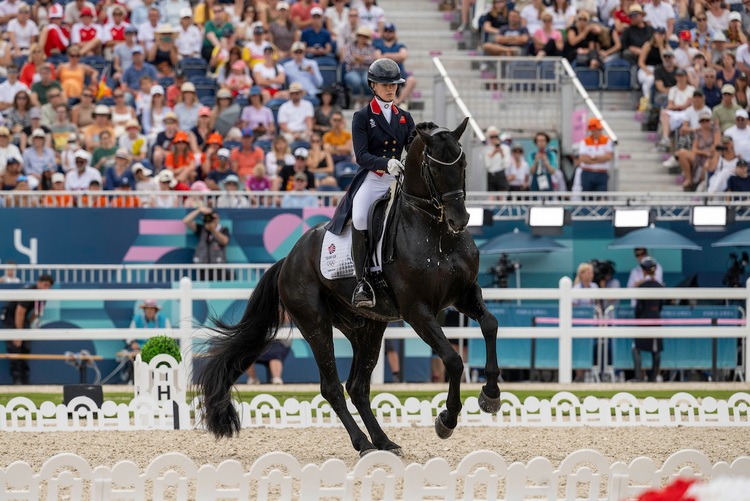For the fifteenth time, Germany won dressage team gold at the Olympics, but the margin in Paris on Saturday was so small that the outcome was in doubt until the very end of the competition.
Germany’s edge over silver medal Denmark in the Grand Prix Special was an uncomfortable 0.121 percent (a total of 235.790 to 235.669), and no German rider broke 80 percent. That was left to Denmark’s newest combination, Cathrine Laudrup-Dufour and Freestyle, marked at a stunning 81.216 percent.
“What to say? Outstanding. Only tiny hiccup for the one-times (changes) at the diagonal,” Cathrine commented, mentioning it was the ride of her dreams.
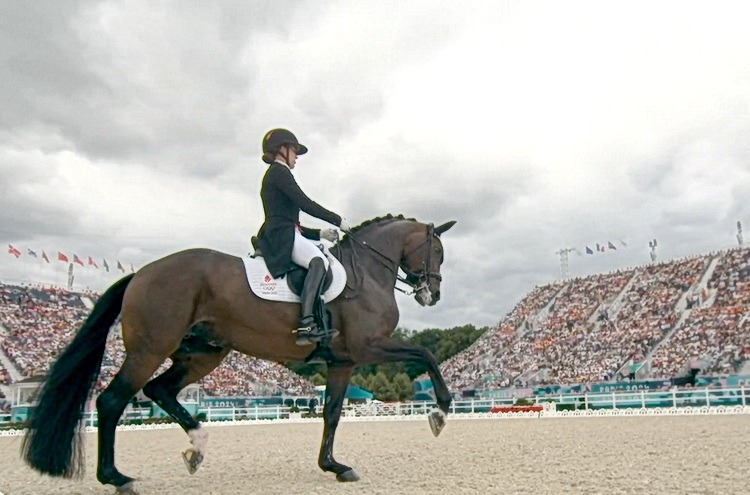
Cathrine Laudrup-Dufour of Denmark had the highest score of the team competition with Freestyle.
Her score wound up being 1.262 percent ahead of world number one Jessica von Bredow-Werndl and TSF Dalera BB, graded at 79.954, yet that was enough for the German to save the day for her country.
When Cathrine’s score was announced before Jessica’s ride, that put the pressure on the defending Olympic champion.
“I was a bit out of breath during Jessi’s test, but she finished brilliantly, kept her nerve,” said German national coach Monica Theodorescu.
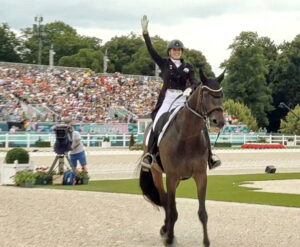
Jessica von Bredow-Werndl waves in triumph after getting the score she needed to secure gold for Germany.
She observed that early in the test, there were false starts into piaffe.
“Dalera wanted to canter, Jessi stopped her and then it took a while until she got into the piaffe,” earning a mark of 5.4 that was uncharacteristic of that duo.
“But otherwise, she was outstanding,” an elated Monica said.
Cathrine was fourth individually in the Tokyo Olympic riding Bohemian, who was the U.S. team alternate with Endel Ots. The Danish anchor rider was backed up by Daniel Bachmann Anderson on Vayron (75.93) and European Championships silver medalist Nanna Skodborg Merrald with Zepter (78.480), whose score was affected by a glitch in the two-tempis.
The team silver (that the riders felt had a golden tint) was Denmark’s best result yet in the Olympics, but all three were also on their country’s winning world championships team in 2022. That was the year Jessica von Bredow-Werndl did not compete for Germany because she was having a baby.
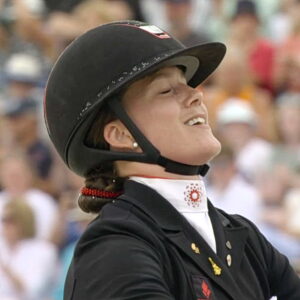
Cathrine Laudrup-Dufour knew she had a great ride for an important score on Freestyle.
Daniel said the team members have known and supported each other since they were children.
“We are the youngest team here and we come in as world champions and we’ve already done so many great things, but we have so much more to come and ahead of us and we are so hungry to do even more,” he said.
Great Britain missed out on a sweep of all the equestrian team golds at Versailles after taking titles in eventing and show jumping. It earned dressage bronze with a total of 232.492 percent. The squad of Carl Hester (Fame), Olympic debutante Becky Moody (Jagerbomb) and World Champion Lottie Fry (Glamourdale) enjoyed a good margin over the Netherlands (221.948).
Prior to the Games, however, Britain was set to go for the gold medal, and might have won it, until a scandal broke last month involving its perennial top scorer, Charlotte Dujardin. She withdrew from the Games and was suspended by the FEI (international equestrian federation) after a whistleblower revealed a video from two-and-a-half years ago, showing the Olympic multi-gold medalist using a longe whip to hit a horse during a private training session.
The timing was a triple whammy that set off an international furor affecting not only Charlotte and the team, but also horse sport. Media at the Olympics kept asking British team members about the issue, and horse abuse became a hot topic globally, with some public sentiment pushing for it to be dropped from the Olympics. Riders emphasized to those inquiring the care taken with their horses, who were living in air-conditioned stalls at the venue, where they beat the oppressive heat with cooling stations.
But the fans who filled the stands were all for the sport, cheering for their countries and the stars who gave their all.
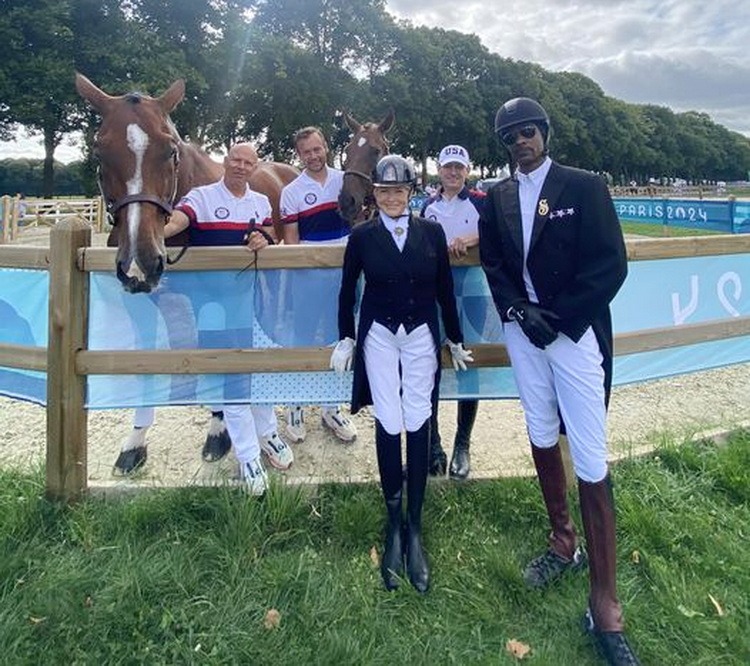
Rapper Snoop Dogg and Martha Stewart, dressed for dressage, visited riders Steffen Peters (Snoop is an admirer of Steffen’s horse, Suppenkasper), Endel Ots with Bohemian and McLain Ward.
Cathrine’s score (on a horse trained and ridden several years ago by Charlotte) was a shocker in its magnitude, and no one was more affected than Jessica. But she handled it before Dalera stepped into the arena.
“You notice it, but it’s no longer in your head at that moment. At that moment, it’s all about the here and now and about delivering what you can deliver,” she said, explaining how she dealt with Cathrine’s result.
Discussing her test, she said, “Unfortunately, we had an incredibly big misunderstanding once in the transition (from walk to piaffe), which was extremely expensive.” Double coefficients there made the mistake a major problem.
“But oh, I didn’t want that thriller, I have to admit. I would have liked to have made it a bit less exciting. But now no one can say that dressage riding is boring,” Jessica concluded.
As she explained, “Dalera is only human.” Once out of those troublesome movements “everything was fine again.”
Monica critiqued the rest of her team, Frederic Wandres (Bluethooth Old/75.942) — who was so overcome with emotion on the podium that he was wiping tears away — and seven-time Olympian Isabell Werth (Wendy/79.894).
“Everyone had a little something,” the coach pointed out.
“Isabell didn’t quite jump through a one-step change on the center line, Freddy slightly changed once in the right pirouette. Thank God Bluetooth found the right coordination again. Otherwise, all three rode really well. Yes, it was just, just, just, just enough.”
Isabell has only been competing Wendy this year, but she called it “a really perfect match between us and I think we both feel really confident and that makes it so easy. She’s so uncomplicated.
“She’s really tall when you stand next to her…and everything is much easier on her, you can sit and just have fun. She’s everything in a perfect construction, and it’s wonderful to have her in time for the Olympics.”
Becky Moody, making her Olympic debut for Britain on a horse she bred, raised and trained, was happy with her experience and a personal best of 76.489. After all, until Charlotte withdrew, she was the alternate looking forward only to a restful 10-day holiday in France.
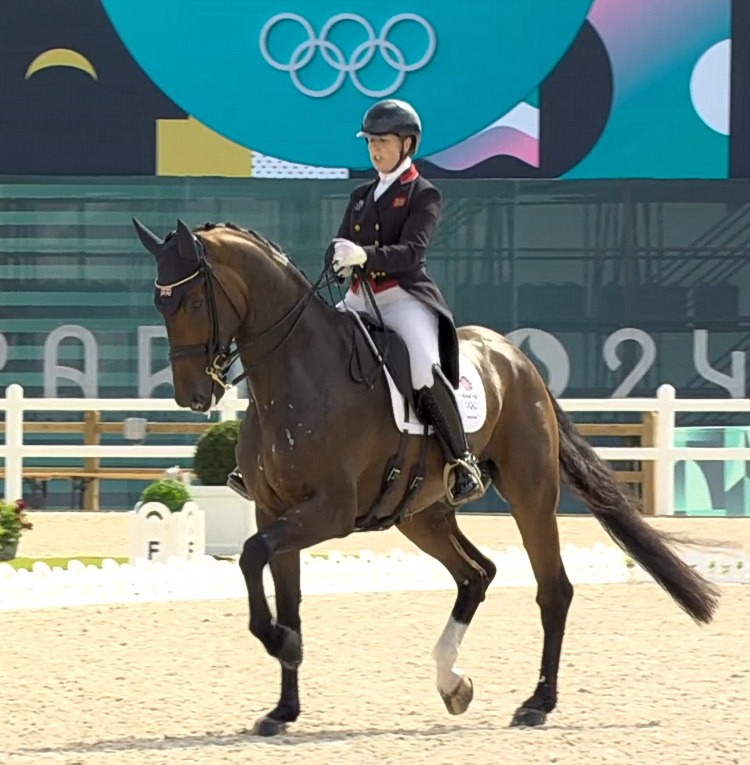
Becky Moody and her home-bred Jagerbomb.
“It was pretty cool. What an incredible stadium,” she said, recounting her experience.
“The crowd was fantastic and my horse was a total legend, so what more could I ask for?
“When you’ve trained them from the beginning, then you do know each other so well. He’s a lovely, lovely horse. He’s been quite spicy here this week. I have to say Carl has helped me out an awful lot to find that inner calm in both of us.”
Carl, the mastermind of Britain’s landmark 2012 Olympic team gold medal who watched nervously from the sidelines, said, “Becky went beyond what we expected.”
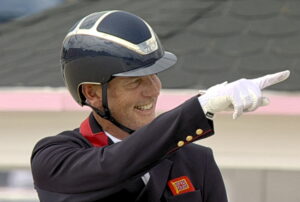
Carl Hester.
As far as his ride, he noted, “I had a fragile start, he was spooky in the beginning. ”
He experienced trouble getting along the side of the ring.
“Everything in this test happens on the side, and I was next to the judge when he rang the bell,” he recounted. At the sound, Fame jumped; Carl just smiled and said “Merci.” He still managed a quite respectable mark of 76.520.
He rode in his first Olympics 32 years ago and noted it doesn’t get any easier as time goes on.
“Every one does get tougher, because of expectations,” he said, but referring to the medal, added “This is a fantastic way to top the week.”
Lottie, whose late mother also rode for the team, clinched the bronze with 79.483 percent.
“I had an amazing ride today. So many improvements from the Grand Prix. He made me very proud. He did some amazing things,” she commented. As always, the extended canter and flying changes were highlights, but she also was pleased with the pirouettes because “he really nailed them today.”
“It’s an amazing feeling to ride in that arena. We both really enjoyed it.”
She is working on a few improvements for Sunday’s musical freestyle, in which the top 18 riders will take part.
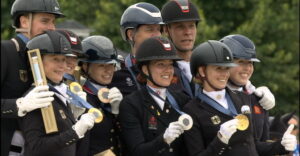
The dressage team medalists from Germany, Denmark and Britain.
The U.S. did not have a team in the Special. It was eliminated during the Grand Prix last week after Jane, Marcus Orlob’s ride, was excused under the “blood rule” for having a tiny scratch on her white fetlock.
She picked that up when she whirled after first entering the arena just as another horse was leaving. (See the full story in the On the Rail section of this website).
Click here for results

